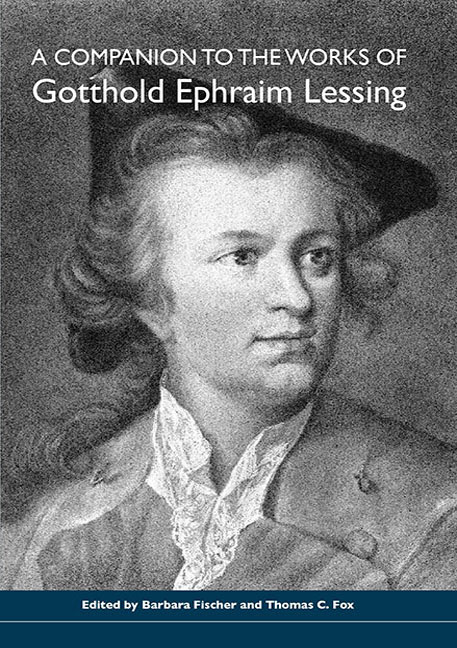Book contents
- Frontmatter
- Contents
- List of Illustrations
- Acknowledgments
- Lessing Editions and Abbreviations
- Selected Works by Lessing
- Introduction
- Lessing's Life, Work, and Times
- Criticism and Aesthetics
- Philosophy and Theology
- Lessing and Philosophy
- Lessing and Theology
- Lessing and the Jews
- Drama and Drama Theory
- Reception
- Contact Organizations
- Works Cited
- Notes on the Contributors
- Index
Lessing and Theology
from Philosophy and Theology
Published online by Cambridge University Press: 28 April 2017
- Frontmatter
- Contents
- List of Illustrations
- Acknowledgments
- Lessing Editions and Abbreviations
- Selected Works by Lessing
- Introduction
- Lessing's Life, Work, and Times
- Criticism and Aesthetics
- Philosophy and Theology
- Lessing and Philosophy
- Lessing and Theology
- Lessing and the Jews
- Drama and Drama Theory
- Reception
- Contact Organizations
- Works Cited
- Notes on the Contributors
- Index
Summary
During the last decade of his life, the years in Wolfenbüttel, Lessing devoted himself substantially to theology, conducting discussions and controversies on fundamental questions with numerous renowned contemporaries. He displayed a surprising expertise concerning difficult problems in the field. Equally striking is his struggle with contemporary theology and its status amidst the Enlightenment's all-encompassing call for reason and rationality. Lessing's statement that he is just a lover of theology and not a theologian (“Liebhaber der Theologie, und nicht Theolog”), for he was not committed to any one dogma (“auf kein gewisses System schwören müssen”) — referring to the respective doctrinal “systems” propagated by Lutherans, Calvinists, and Catholics — must be viewed in this larger context. Lessing's remark does not reflect a superficial point of view or a lack of knowledge about theological issues. His objections to errors he perceived in the theology of his time are based on theological expertise combined with perspicacious analytical power.
Lessing's Commitment to Theological Questions: An Overview
The first of Lessing's Wolfenbüttel publications with a primarily theological character struck theologians like a thunderbolt because of its significance to the history of the Churches and their central doctrines: Berengarius Turonensis: oder Ankündigung eines wichtigen Werkes desselben (1770, Berengarius Turonensis: Or Announcement of an Important Work by Him).Shortly after moving to Wolfenbüttel to work as a librarian at the famous Herzog-August-Bibliothek, Lessing discovered in the library a hitherto unknown manuscript by Berengar of Tours (999–1088), a medieval theologian who had been denounced as a heretic. In this work, Rescriptum contra Lanfrancum (Reply to Lanfranc) Berengar sought to refute the ideas of Lanfranc of Bec (ca. 1010–1089), his chief opponent in the controversy concerning the doctrine of transubstantiation (Abendmahlsstreit). Lessing saw in Berengarius a precursor (or even “advocate”) of the Lutheran doctrine. As for the genre, the Ankündigung constitutes one of Lessing's characteristic “rescues” or “vindications” — a retrieval of another man's honor that he had performed many times already, even in his early years, and executed brilliantly. For his extraordinary discovery and skillful presentation of the manuscript by Berengarius, previously believed lost, Lessing was almost awarded an honorary doctorate by the theological faculty at Leipzig, as his brother Karl told him in a letter dated 4 June 1771.
- Type
- Chapter
- Information
- A Companion to the Works of Gotthold Ephraim Lessing , pp. 157 - 184Publisher: Boydell & BrewerPrint publication year: 2005



